Gathering Storm Over Syria
August 28, 2013 at 2:07 pm | Posted in Arms Control, Human Rights, International Relations, World Politics | 1 CommentTags: Arms Control, Human Rights, Iran, Iraq, Israel, Kurds, Middle East, Russia, Syria, United Kingdom, United Nations, United States
Grotesque images of children foaming at the mouth as they lay dying from an apparent chemical weapons attack in the eastern suburbs of Damascus on 21 August 2013 was, in the words of US Secretary of State John Kerry, a “moral obscenity.” Medecins Sans Frontieres (MSF) reports that the three hospitals it supports in Damascus treated 3,600 patients with symptoms of poisoning and 355 of them have died. While Kerry and his counterparts in Britain, France, Turkey, and Saudi Arabia have been quick to blame the attack on the Bashar al-Assad regime they have not yet produced any evidence linking the regime to the attacks. MSF reports that while there are strong indications that thousands of patients were exposed to a neurotoxic agent, they “can neither scientifically confirm the cause of these symptoms nor establish who is responsible for the attack.”

Indeed, the timing of the attack—on the one year anniversary of President Barack Obama’s warning to the Assad government that the use of chemical weapons against their adversaries would cross his “red line”—is suspicious. The regime, by all accounts, was pushing back the rebels. Why would it now invite retribution from the West? We don’t know what chemicals were used or even who gave the order to launch the chemical weapons. Even if the attack was launched by Syrian government forces, is it possible that it was by a mid-level officer fearful of failure—not because the regime has qualms killing its own people, but because it is not mad enough to invite a hail of missiles?
Washington initially balked at the UN inspectors going to investigate the attack and then when they eventually commenced their inquiry, the White House claimed that the evidence will necessarily be tainted since it was already five days after the attack. Yet, scientists have found the unique chemical signature of sarin in a Kurdish village 4 years after Iraqi warplanes dropped cluster bombs according to a New York Times report and the UN investigators are confident of finding evidence if there are any. Long years of experience have given investigators sophisticated techniques to decipher the use of chemical weapons long after the fact. Tellingly, Syrian Foreign Minister Walid al-Muallem told reporters that the UN asked permission to access the sites of the alleged chemical attacks only on Saturday 24 August and permission was granted the next day! This does not qualify as stalling by any standard. While the investigators have no mandate to determine who was culpable, the fact that their convoy, when escorted by Syrian government forces, was shot at and had to retreat temporarily is also suspicious. Why should the government shoot its own military escorts?

The US and UK governments claim to have incontrovertible evidence that the Assad regime was responsible for the attacks but no such evidence has been presented and journalists do not press them to reveal this secret evidence. As Noam Chomsky noted many years ago, “The smart way to keep people passive and obedient is to strictly limit the spectrum of acceptable opinion, but allow very lively debate within that spectrum.” Thus, mainstream media in the US or the UK have not conducted interviews with Syrian government officials—except for a few cameo quotes which are then obscured by long interviews with administration spokesmen—or even the UN inspectors on the ground.
No mention has been made in the mainstream media that Carla Del Ponte, a member of the UN Independent Commission of Inquiry on Syria reported in May 2013 that testimony from medical personnel indicated “strongly but not incontrovertibly” that rebel forces were using the nerve agent sarin. In fact, the New York Times edited its online article on the alleged use of chemical weapons 22 times on Monday August 26, mainly to shore up support for the administration’s position. And after the Bush White House assurances of weapons of mass destruction in Iraq 10 years ago, claims by the Obama White House of chemical attacks by the Assad regime without any evidence to back it up is equally suspect.
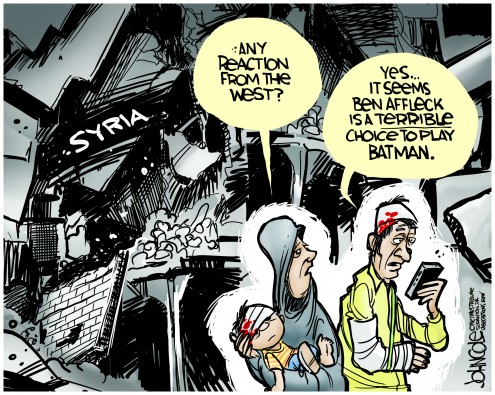
In fact, as veteran journalist Gwynne Dyer notes, if we apply the time-honored test of who benefited from the chemical attack—the only likely answer are one of the many rebel factions knowing that their use will bring retribution on Assad. Indeed, the focus on chemical weapons attack also detracts from the atrocities of the rebels—notably the ethnic cleansing of Kurds in the north-east forcing 40,000 of them to flee to northern Iraq in the biggest refugee exodus of the Syrian civil war. In all the moral fury marshaled by US and UK administrations there is nary a word about this outrage!
What is also remarkable is that left-liberal opinion in the United States is so overjoyed that Obama is not Bush that they do not hold him to the same standards of scrutiny to which they have held other presidents. No large anti-war protests are planned when the US has already stationed four ships and some submarines capable of firing cruise missiles at Syria in the eastern Mediterranean and Prime Minister David Cameron has called back parliament to debate a punitive strike on Syria.

Then again there is the question of legal justification. As it is clear that there will be no mandate from the United Nations Security Council for a punitive strike on Syria since Russia is irremediably opposed to it, justifications are trotted out on what William Hague, the UK Foreign Secretary said was “a great humanitarian need and distress” and claimed that it is based on “international law.” It is not clear though which “international law” was being invoked. If it was the international convention on the non-use of chemical and biological weapons, three major states in the Middle East–Egypt, Israel, and Syria–have not ratified it. So Syria is being asked to adhere to a treaty it has not signed—an excellent legal precedent!
US forces have admitted dropping white phosphorus over Fallujah in 2004 and Britain and the United States had supplied chemicals and weapon-making equipment in the 1980s to Saddam Hussein for his war against Iran. But of course, in true imperialist hubris, the laws they impose on others do not apply to themselves.
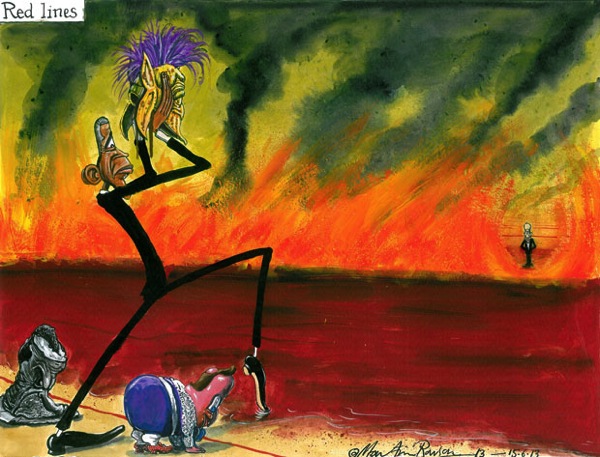
Not only is there no compelling evidence that the Syrian government had deployed chemical weapons and no legal basis exists for attacking the country, but options to attack are so marginal that they are merely a pointless punitive strike. Israel has attacked Syria with missiles several times without causing any real change in the Assad government’s behavior and it is unclear what more can be expected from a US-led NATO strike. Clearly Syria’s chemical weapons cannot be targeted as that would cause unimaginable casualties. Syrian government, anticipating an attack would already have reconfigured its command-and-control operations so they do not present an easy target. It is only those command-and-control positions that are not easily moveable which could be attacked and these may cause large civilian casualties as well. Military airfields could be cratered and aircraft bombed and this may hurt the Assad regime in the short run. Even the Chairman of the US Joint Chiefs of Staff, General Martin Dempsey, has admitted that less than 10 percent of the casualties in the two and a half years of civil war in Syria are accounted by bombs.
The conclusion is inescapable: any attack on Syria is simply to counter domestic opponents who claim that the Obama is weak. His Republican nemesis, John McCain and his allies have been hunkering for a more muscular American response to Syria even though it would raise military spending and further complicate the budgetary situation in Washington. But Obama can now become a ‘war president.’ For that, many Syrians will die a senseless death.
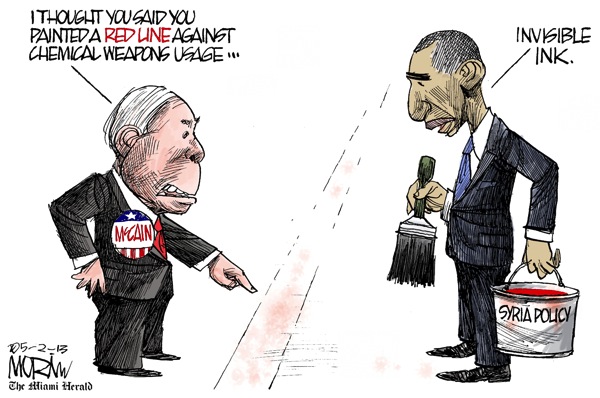
Even worse, launching missile strikes against the Assad regime will complicate the current moribund peace talks which are the only way to resolve the crisis. Here, too the US is torpedoing efforts to bring the warring parties together by insisting that Syria’s close ally, Iran, be excluded from it. There are so many rebel factions—some 1,200 different military units by Patrick Cockburn’s count ranging from small family outfits to large organized units with tanks and artillery—that they cannot even agree on a delegation to represent them. It is as he says “a failed country and a failed opposition.”
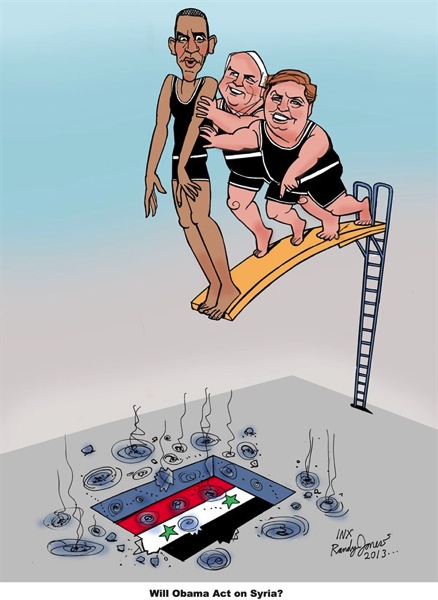
This is not a situation that calls for surgical air strikes. If the Obama administration really wants to bring peace, it needs to cooperate with Russia and get their regional allies to sit together at a conference table after agreeing to a cease fire.
Syria in the Age of Punitive Missile Strikes
August 27, 2013 at 2:15 pm | Posted in Uncategorized | 1 CommentTags: Arab League, Arms Control, Australia, Egypt, Human Rights, international relations, interstate system, intervention, Iran, Iraq, Israel, Middle East, NATO, Syria, United Kingdom, United Nations, United States, world politics
US Secretary of State John Kerry has condemned the apparent chemical attack on the eastern suburbs of Damascus on 21 August 2013, the Syrian capital, as a “moral obscenity” and a spokesman for the British Prime Minister David Cameron called it “completely abhorrent.” Almost a year ago to the day, on 20 August 2012, President Barack Obama had warned his Syrian counterpart that the use of chemical weapons would cross his “red line.” The US has already positioned four ships armed with cruise missiles in the eastern Mediterranean and aircraft may also be launched from Britain’s Akrotiri airbase in Cyprus a mere 100 miles from Syria’s coast.
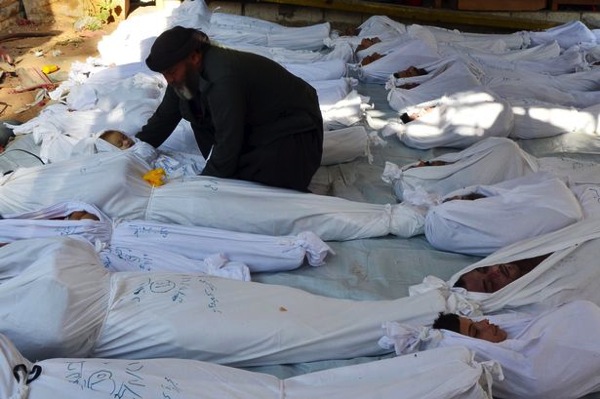
Though Kerry and Cameron are categorical in blaming the Bashar al-Assad regime for the chemical attacks, no proof has been produced to back these assertions nor has it been determined as to what chemicals had been used. No precise casualty counts are available and no one know who, if anyone, gave the order to use chemical weapons. When UN inspectors went to Syria, their convoy escorted by the Syrian military came under fire and they had to withdraw briefly before resuming their inspection. The White House claims that since these inspections come five days after the attack the evidence will necessary be tainted and has decided to ignore the investigation and its results just as the Bush White House “knew” there were weapons of mass destruction in Iraq as it launched the disastrous attack on that country ten years ago. Once again, the United States and the United Kingdom have appointed themselves the international judge, jury, prosecutor, and executioner in an untrammeled exercise of hubris.
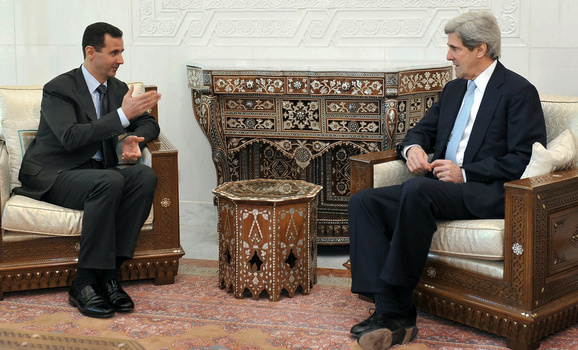
Once the decision to go to war has been taken in the councils of state in Washington, London, Paris, and Sydney (Australia begins its term as chair of the UN Security Council besides being a reliable side kick to the Washington-London anglo-saxon axis), the press has rushed to beat the war drums in support. The New York Times edited its online article on the alleged use of chemical weapons 22 times yesterday, mainly to shore up support for the administration’s position. Crucially, there has been no report that Carla Del Ponte, a member of the UN Independent Commission of Inquiry on Syria reported in May 2013 that testimony from medical personnel indicated “strongly but not incontrovertibly” that rebel forces were using the nerve agent sarin. This finding and the attack on UN inspectors being escorted by the military should at least create doubt on who actually used the chemical weapons, if indeed these were used.
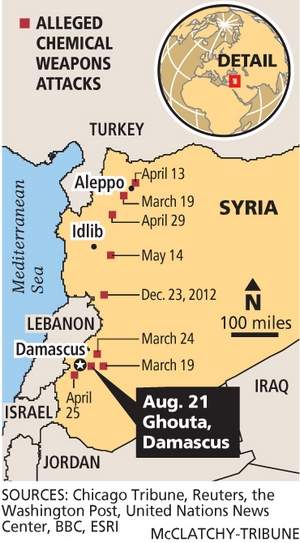
Then again there is the question of legal justification. As it is clear that there will be no mandate from the United Nations Security Council for a punitive strike on Syria, justifications are trotted out on what William Hague, the UK Foreign Secretary said was “a great humanitarian need and distress” and claimed that it is based on “international law.” It is not clear though which “international law” was being invoked. if it was the international convention on the non-use of chemical and biological weapons, three major states in the Middle East–Egypt, Israel, and Syria–have not ratified it. Prime Minister Cameron thundered:
“Almost 100 years ago, the whole world came together and said that the use of chemical weapons was morally indefensible and completely wrong. What we have seen in Syria are appalling scenes of death and suffering because of the use of chemical weapons by the Assad regime.
“I don’t believe we can let that stand. Of course any action we take, or others take, would have to be legal, would have to be proportionate. It would have to be specifically to deter the future use of chemical weapons.
“This is not about getting involved in a Middle Eastern war or changing our stance in Syria or going further into that conflict. It is nothing to do that. It is about chemical weapons. Their use is wrong, and the world shouldn’t stand idly by.”
But this conveniently glossed over the inconvenient fact that Britain and the United States had supplied chemicals and weapon-making equipment in the 1980s to Saddam Hussein for his war against Iran.
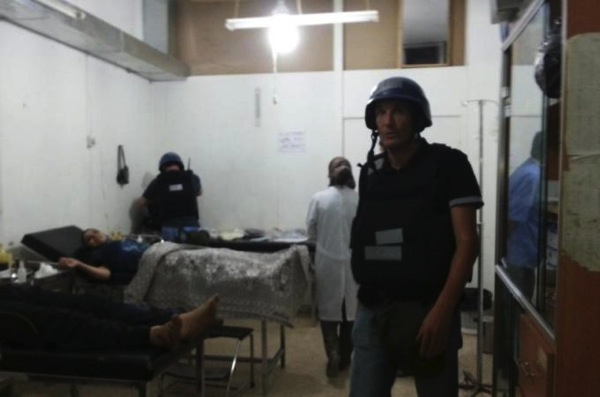
And in the United States, the War Powers Resolution of 1973 precludes the president from going to war without congressional authorization except in self-defence. Candidate Obama had unequivocally stated in response to a direct question that:
The President does not have power under the Constitution to unilaterally authorize a military attack in a situation that does not involve stopping an actual or imminent threat to the nation.
As Commander-in-Chief, the President does have a duty to protect and defend the United States. In instances of self-defense, the President would be within his constitutional authority to act before advising Congress or seeking its consent.
Of course, as president, he had not sought Congressional approval for US actions in Libya two years ago, claiming that it was very limited in scope.
Not only is there no compelling evidence that the Syrian government had deployed chemical weapons and no legal basis for attacking the country, but options to attack are so marginal that they are merely a pointless punitive strike. Israel has attacked Syria with missiles several times without causing any real change in the Assad governments behavior and it is unclear what more can be expected from a US-led NATO strike. Clearly Syria’s chemical weapons cannot be targeted as that would cause unimaginable casualties. Syrian government, anticipating an attack would already have reconfigured its command-and-control operations so they do not present a clear target. It is only those command-and-control positions that are not easily moveable which could be attacked and these may cause civilian casualties as well.
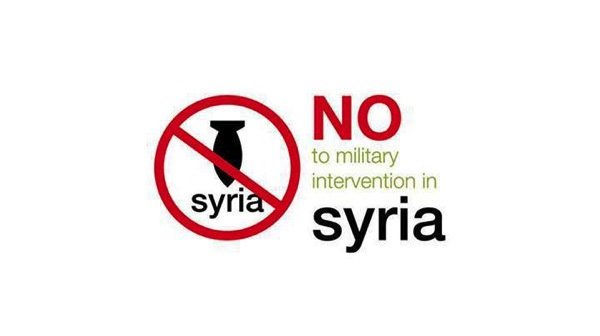
The Washington Post reports that a Reuters/Ipsos poll conducted on the week of August 19-23, the very week in which television images of the alleged chemical attack flickered across television screens, only 9 percent of the respondents supported a military intervention in Syria. It is clear that there is no support for an extensive intervention either by troops on the ground or a prolonged air strike against the Syrian forces and in any case President Obama has ruled out regime change.
The conclusion is inescapable: any attack on Syria is simply to counter domestic opponents who claim that the Obama is weak. For that some Syrians will die a senseless death.
Hail to the Chief!
Western Imperialism, Libya, and the Arab Revolts
March 22, 2011 at 3:42 am | Posted in democracy, International Relations, World Politics | 3 CommentsTags: France, Global South, India, international relations, interstate system, intervention, Iran, Iraq, Kosovo, Libya, Middle East, North Africa, Persian Gulf, Qatar, Serbia, United Arab Emirates, United Kingdom, United States, US hegemony
The United States and some of its European allies have once again launched an attack against a state in the Global South–this time as a humanitarian intervention to prevent Colonel Muammar Gaddafi from ‘slaughtering’ his opponents in Libya, and backed by a United Nations Security Council resolution and a resolution by the League of Arab States. Strikingly, none of the combatant governments–the United States, Britain, France, or the lesser European powers–sought legislative approval for before launching missiles and war planes against Libya. For an assault against a third-rate military power, it seems such democratic niceties need not be observed.
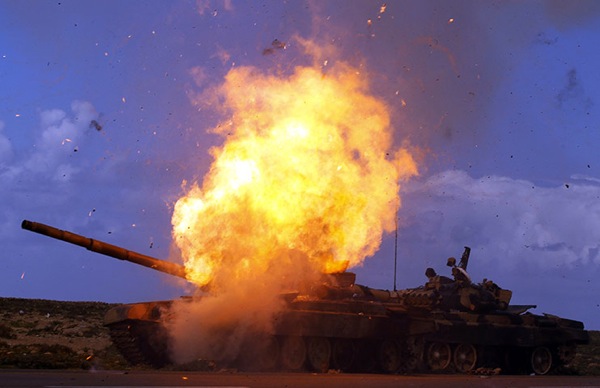
Even if it was a foregone conclusion that their national legislatures would have supported the assault against Colonel Gaddafi’s forces–as the British House of Commons did by a lopsided margin–this was largely due to a blanketing of other options in the mainstream media which made no mention of the ad hoc commission established by the Peace and Security Council of the African Union to mediate between the Colonel and his opponents. Equally importantly, in the absence of a detailed debate, there has been little planning on what would happen were a stalemate to develop–a possibility that Admiral Mike Mullen, the Chairman of the US Joint Chiefs of Staff admitted was a real possibility–or in a post-Gaddafi Libya
Indeed, this is hardly a war against Libya. The superiority of the United States in the air is so overwhelming that as Tom Englehardt has noted there is no element of danger for the pilots of US planes who last faced a serious threat in Vietnam in the early 1970s. The Serbian air force did not even bother to take to the air in the war over Kosovo, and in the First Gulf War, the powerful Iraqi air force flew most of its planes to Iran rather than engage with the US-led forces. For American pilots it is as safe to bomb another country as it is to pilot drones over Afghanistan from the Creech Air Force base in Nevada where “those leaving [the base] pass that warns them to “drive carefully” as this is “the most dangerous part of your day”!
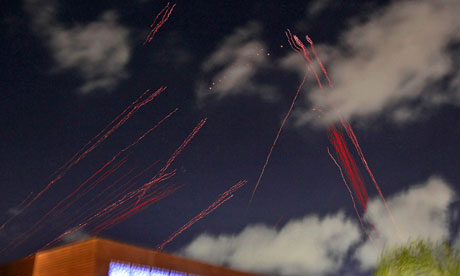
With the absence of any danger to US pilots, this resembles colonial wars where well-armed European troops mowed down with their repeater rifles hordes of native warriors armed only with spears and bows and arrows. Once American planes have taken out all Libyan air defense systems, British and French planes will enforce a no-fly zone, again at no risk to themselves. Underlining the suspension of the ordinary calculus of war, President Barack Obama embarked on his previously scheduled tour of three South American states even as his planes and missiles were pounding Libya.
For NIcolas Sarkozy of France, after the right wing Front National led by Marine Le Pen made historic gains in the first round of municipal elections, an image as a ‘war President‘ may just be the thing to propel him to victory in next year’s presidential elections–damn the consequences for Libyans, in true imperialist tradition!
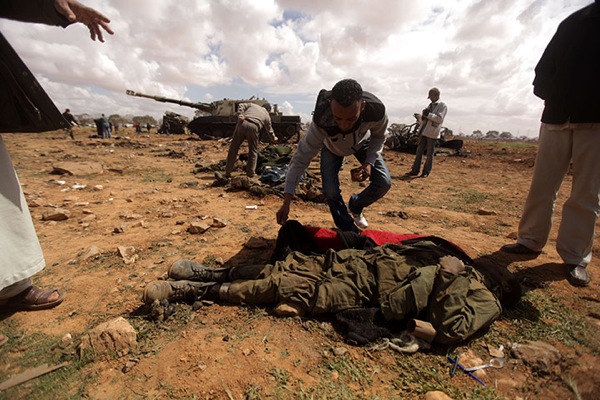 But the sheer ferocity of the assault is causing anguish even among those who initially called for the imposition of a no-fly zone. Though the League of Arab States had called for the imposition of a no-fly zone, images of the carnage wrought by missiles and bombs led its Secretary-General Amr Moussa to say after the second day of air strikes: “what is happening in Libya differs from the aim of imposing a no-fly zone, and what we want is the protection of civilians and not the bombardment of more civilians.” Intense pressure however made him back-track, despite widespread revulsion in the Arab world at the carnage sustained by Libyan civilians. Nevertheless, only two small states–Qatar and the United Arab Emirates–among the 22-member states of the League have agreed to take part in war effort. Russia and China which abstained from the Security Council vote have voiced concerns about the attacks and India, which also abstained from the Security Council resolution, became the first country to call for a cessation of air strikes.
But the sheer ferocity of the assault is causing anguish even among those who initially called for the imposition of a no-fly zone. Though the League of Arab States had called for the imposition of a no-fly zone, images of the carnage wrought by missiles and bombs led its Secretary-General Amr Moussa to say after the second day of air strikes: “what is happening in Libya differs from the aim of imposing a no-fly zone, and what we want is the protection of civilians and not the bombardment of more civilians.” Intense pressure however made him back-track, despite widespread revulsion in the Arab world at the carnage sustained by Libyan civilians. Nevertheless, only two small states–Qatar and the United Arab Emirates–among the 22-member states of the League have agreed to take part in war effort. Russia and China which abstained from the Security Council vote have voiced concerns about the attacks and India, which also abstained from the Security Council resolution, became the first country to call for a cessation of air strikes.
The role of the League of Arab States also appears compromised. First, Robert Fisk reported that Washington had asked Saudi Arabia to furnish arms to the rebels in Benghazi to which King Abdullah, facing his own problems, had failed to respond even though he loathes the Libyan leader who had tried to have him assassinated just over a year ago. Then the Wall Street Journal reported that with Washington’s encouragement and knowledge, the Egyptian military had begun to slip arms to the rebels. This raises the question of whether the post-Mubarak regime is going to play the role of another Western puppet–indeed Amr Moussa sudden back-tracking of his condemnation of the killings of civilians in the Western air raids gives no assurance of an independent regime emerging from the ashes of Mubarak’s autocracy. Indeed, it may well be that as Ali Abunimah wrote in the Electronic Intifada: “The greatest danger to the Egyptian revolution and the prospects for a free and independent Egypt emanates not from the baltagiyya–the mercenaries and thugs the regime sent to beat, stone, stab, shoot and kill protestors in Cairo, Alexandria and other cities– but from Washington.”
Many of the commentators who support the assault against forces loyal to Colonel Gaddafi suggest, even if grudgingly, that only the Western powers have the means to stop his slaughter of his opponents. This is not only to conveniently forget that the Colonel has ruled Libya with an iron hand but also that after he agreed to give up his weapons of mass destruction and join the war on terror, Western powers cosied up to him for lucrartive arms and oil contracts.
It is also to ignore that the African Union had opposed military intervention in the Libyan conflict and that the AU’s own ad hoc commission which Colonel Gaddafi had agreed to meet was not permitted to work as Western military intervention effectively ruled out a peaceful resolution of the conflict.
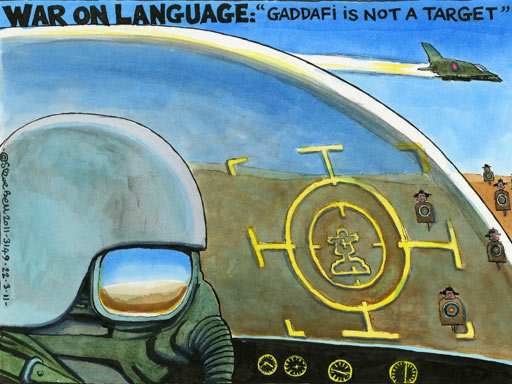
Most importantly, there appears to be no clarity on the goals of the air attacks on Libya. The British and American military leaderships claim that the removal of Colonel Gaddafi is not the aim of the air strikes–and indeed not within the scope of the Security Council resolution–but their political leaderships assert that regime change is indeed the goal. Responding to the attacks, the Libyan regime has said that it would arm civilians to fight against ‘crusader colonialists’–this could lead to a prolonged conflict were the regime to be deposed as what is left of his forces and supporters launch a bloody civil war. A civil war on the footsteps of Europe could lead to a flood of refugees and may well pave the way to occupation. Alternatively, in the case of a stalemate, Benghazi and eastern Libya may turn into a Western protectorate.
No-fly zones, Libya and the Arab Revolt
March 17, 2011 at 8:26 pm | Posted in democracy, Human Rights, International Relations, World Politics | 2 CommentsTags: African Union, Arab League, Bahrain, Brazil, China, Democratic Republic of Congo, France, Germany, India, interstate system, intervention, Iran, Iraq, Jordan, Kuwait, Mauritania, Middle East, NATO, North Africa, Oman, Palestine, Russia, Saudi Arabia, South Africa, Uganda, United Arab Emirates, United Kingdom, United States, US hegemony, Yemen
The United Nations Security Council–with the abstention of Russia, China, Germany, India, and Brazil–has done what military analysts have said would be folly: it has voted to impose a ‘no-fly zone’ on Libya and ‘take all necessary action’ short of ‘a foreign occupation force of any form’ to force Colonel Muammar Gaddafi out of power. ‘All necessary action’ could involve a ‘no-drive zone’ to cripple the Libyan regime’s armored vehicles from attacking Benghazi, Misrata, Tobruk, and other remaining rebel strongholds as well as sending in military advisers.
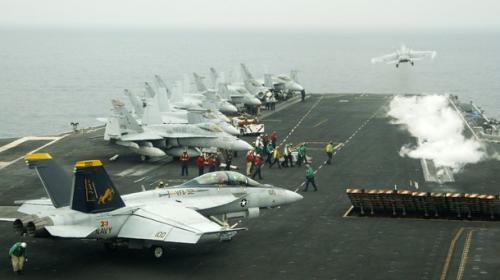
Advocates of the resolution have evoked humanitarian reasons–chiefly the regime’s brutal counter-assault using its air force and paramilitary forces to roll back the rebels–for intervention. This is buttressed by the belief that Libya is not even a third-rate power and its defenses can easily be destroyed. And the rebels are clothed in the accoutrements of democracy though the only thing that unifies the rebels is their opposition to the Gaddafi regime and it is not clear what a post-Gaddafi Libya will look like or even whether it will remain unified.
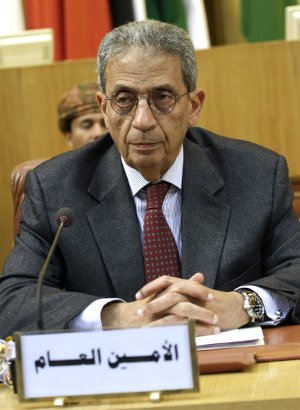
If humanitarian reasons are the chief justification, then it is clear that there is a double standard that is applied. Much has been made of the Arab League’s call for the imposition of a no-fly zone over Libya, but there has been no report of the fact that it was opposed by both Syria and Algeria. The states in support of the resolution–Saudi Arabia, Bahrain, Kuwait, the United Arab Emirates, Jordan, Oman, and Yemen–are hardly paragons of democracy. The governments of Yemen and Bahrain have brutally crushed demonstrations in their own countries; and Saudi Arabia and four other Gulf Cooperation Council states have sent more than 2000 troops to Bahrain to help the regime stay in power! Saudi Arabia has moreover prohibited protests in its eastern province, declaring such protests “illegal and un-Islamic”–and Saudi Arabia has more than 8,000 political prisoners!
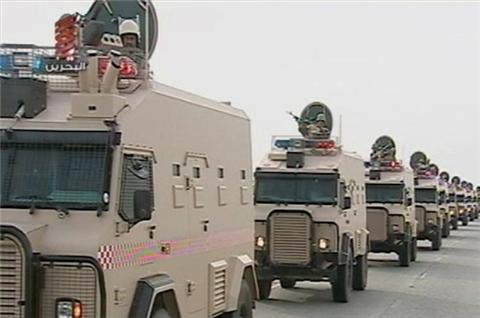
More importantly, there has been virtually no report in mainstream media in the West, that the African Union has condemned attempts to impose a no-fly zone on Libya. The AU’s 15-member peace and security council resolved, to “reaffirm[s] its firm commitment to the respect of the unity and territorial integrity of Libya, as well as its rejection of any form of foreign intervention in Libya.” It formed an ad hoc committee composed of South Africa, Mauritania, Uganda, and the Democratic Republic of Congo to engage in dialogue with all parties in Libya for a speedy resolution of the crisis.
There is no certainty that the military operation will be a smooth and easy one. Less than a month ago, US Secretary of Defense, Robert Gates, had told cadets at West Point that any secretary of defense who advises a president to intervene militarily in Asia or Africa ought to have his head examined. Admiral Mike Mullen, the Chairman of the US Joint Chiefs of Staff, has said that even the imposition of a ‘no-fly zone’ let alone all the other ‘necessary actions’ voted on by the Security Council will be “an extraordinarily complex operation to set up”–and of course, the major burden will be on the United States which is already engaged in two wars. British Prime Minister David Cameron may have led the charge for a ‘no-fly zone’ but Britain does not even have an aircraft carrier! General Wesley Clark, who commanded NATO forces in Kosovo, has argued that intervention in Libya does not meet critical tests: it is not in US national interest, the purpose of intervention is not clear, political prospects were Gaddafi to be ousted is unclear.
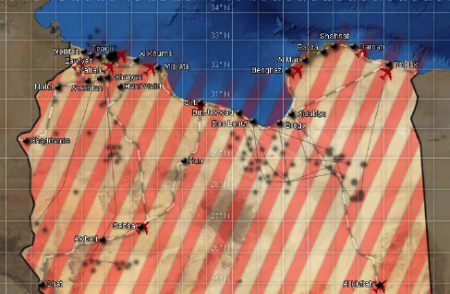
A ‘no-fly zone’ moreover, might have had a chance of success ten days ago when the Gaddafi regime launched its counter-assault. Now with the rebels in full retreat, and the regime ascendant–with the regime poised to assault the rebel capital of Benghazi–it is not clear whether a no-fly zone alone will suffice. A ‘no-drive zone’ is an even more ‘complex operation’ and increases the odds of British, American, and French casualties–Germany has refused to contribute troops to a NATO operation against Libya and Turkey is unlikely to participate as well. Colonel Gaddafi has promised to take the battle into the Mediterranean and that increases the prospects of Western civilian casualties and an escalation of the war. It will be a war Gaddafi may well lose, but it is not likely that NATO can extricate itself easily–and remember there is no international sanction for a foreign occupation force ‘of any form’ in the Security Council resolution!
If intervention is to promote democracy, George Monbiot notes that the Economist Intelligence Unit ranks Libya 158th of 167 countries on its Democracy Index while Saudi Arabia is ranked 160th–and in Libya “women are not officially treated as lepers were in medieval Europe.”
Here, the double standard is all too obvious. Saudi Arabia in the only remaining “swing producer”–the only oil-producing nation with enough excess capacity to raise production if supplies fall short of demand. But US diplomatic cables released by Wikileaks suspect that Saudi claims of reserves are exaggerated by almost 40 percent.
The Arab Revolt is not really about democracy–elections have not delivered results in the past, and when election results have angered the United States as in the Hamas triumph in Palestine, the US has condemned the results and applauded Israel’s punitive punishment of Gaza. The protests are about a wholesale change–not merely a change of rulers–because where there is a legal opposition, the opposition is often equally discredited.
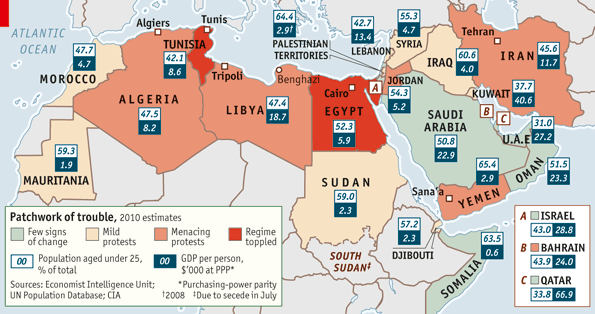
Key to the revolt has been an explosion of information–not only through al-Jazeera, but also through the Internet, travel, and TV–and the enormous growth of people aged below 25 to levels unmatched almost anywhere else. The youth exposed to a wider range of information and experiences have greater aspirations–and now that two of the tyrants have been ousted, the sense of empowerment is raised as Brian Whittaker notes.
It is this sense of empowerment that will take a beating if Western forces occupy Libya for a long while. It will signal pro-Western governments in the Persian Gulf–Saudi Arabia and the other oil-rich sheikdoms that they can count on mealy-mouthed appeals for restraint from Washington, London, and Paris as they crush their domestic oppositions. Ironically, this may play well in Iran’s favor. The Islamic Republic is very careful not to portray the conflicts in a sectarian light: if it can portray it as an attack on Muslims, and when Saudi Arabia, the Custodian of Holy Places, sends its troops to slaughter other Muslims, Iran raised the issue not with the Arab League but with the Organization of Islamic Conference. The Iranian Foreign Minister asked the Conference: “How can one accept that a government has proceeded to invite foreign military forces for the crackdown of its own citizens?” Tehran will gain even more credibility with the Arab forces when American, British, and French forces intervene in Libya.
Wikileaks, Iran, and the Middle East
December 10, 2010 at 3:24 pm | Posted in Arms Control, Human Rights, International Relations, Nuclear Non-Proliferation, World Politics | Leave a commentTags: international relations, interstate system, Iran, Israel, Middle East, Palestine, Saudi Arabia, US hegemony, world politics
Wikileaks–the largest unauthorized dump of diplomatic cables in history–has cast light into the shady world of diplomacy and in the Middle East revealed the deep animosity the rulers of Saudi Arabia have for the Iranian government. This is of course not news as the al-Ahram weekly noted but it did confirm to the Arab street how complicit their rulers are with the United States. It is not surprising that Saudi Arabia and other Persian Gulf states that had supported Saddam Hussein;s war against Iraq urged the US to strike against the Islamic Republic: “cut off the head of the snake,” the Saudi king Abdullah reportedly urged the Americans. And, King Hamad bin Isa al-Khalifa of Bahrain said that the United States should take out Iran’s nuclear capabilities “by whatever necessary.”
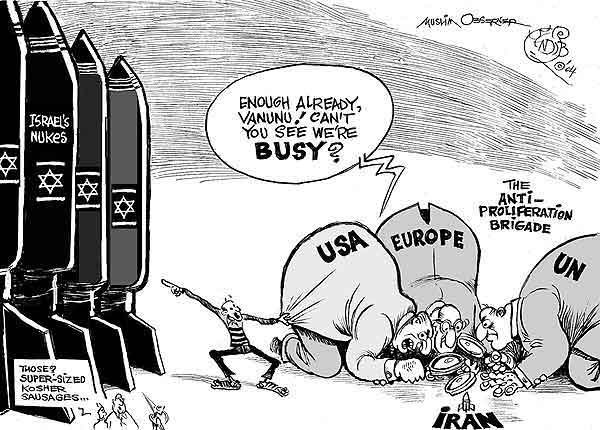
If the Obama Administration cite these and other remarks to justify a broad-based Arab opposition to Iran’s nuclear program, as Sharif Abdul Kouddous notes, none of these are democratic regimes and are propped up by American military, diplomatic, and financial support. The opposition to Iran expressed by these regimes was not reflected in the Arab Street. A Brookings Institute poll indicates a vast majority of the Arab population believe that the United States and israel are a greater threat to regional peace and political stability than Iran and they clearly recognize the double standards applied to Israel and Iran. Israel has over 200 nuclear warheads and faces no sanctions while Iran has not a single warhead, has said that it is not pursuing a nuclear weapons program, is facing increasingly stringent sanctions. The Wikileaks expose autocratic Arab rulers to be what they are: stooges dependent on the United States for their survival.
Moreover, as the media was focused on the information divulged by Wikileaks and the arrest of Julian Assange, the Obama Administration gave up trying to persuade the Israeli government to freeze settlement activity for 90 days so that the ‘peace talks’ with the Palestinian Authority could be resumed. They had concluded that even with a bribe of $3 billion dollars, the Israeli government was unwilling to cease constructing settlements in the Occupied Territories for a mere three months. As Andrew Bacevich notes, though the Israeli military power is unparalleled in the region, the continued offer of advanced US weaponry–as the offer of 20 F-35 aircraft for a nonrenewable 90-day freeze on settlement activity–continues to give credence to Israeli politicians’ claim that the security of the Jewish state is in jeopardy.
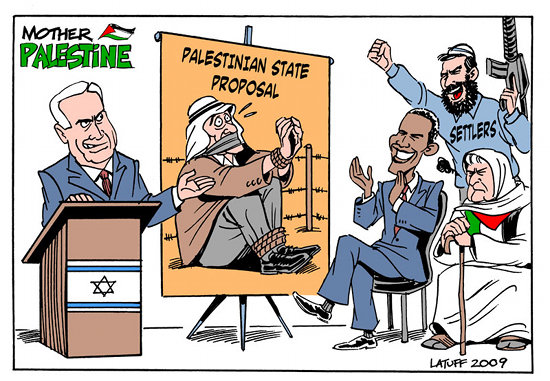
Bizarrely, as Palestinians dispatched firefighters to fight the Mount Carmel fire–the largest fire in Israel’s history–in early December 2010, Israeli soldiers were deployed near the Palestinian villages of Bil’in, Nil’in and Nabi Saleh, where Israelis, Palestinians, and international activists organize weekly non-violent protests against Israel’s 480-mile separation wall and its policy of settlements in the Occupied Territories. And the Israeli Ambassador to the United States, Michael B. Oren while acknowledging the contributions of the Palestinian fire-fighters chose to castigate the Palestinian leadership for not returning to the talks without mentioning the reasons for their refusal–the continued and unlawful expropriation of their land!
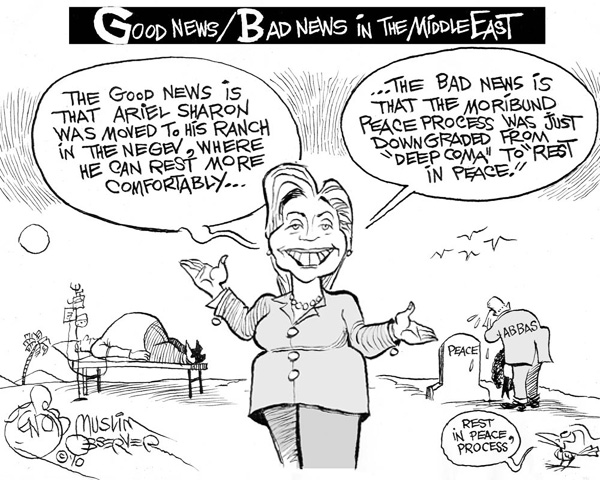
Indeed, Palestinian Authority President Mahmoud Abbas is in such an untenable situation with the Obama Administration urging him to continue to talk to the Israelis while the latter continue to gobble up Palestine and work to render any potential Palestinian state unviable, that he has threatened to extinguish “Palestinian self-rule” in the West Bank. This would imply that the Israelis will have to resume responsibility for the 2.2 million Palestinians as the military occupying power, a responsibility they had relinquished after the Oslo Accords and the creation of the Palestinian Authority in 1994. If this would cause chaos in the short-run as the Palestinian Authority employs some 150,000 people, it will put an end to a farcical situation and will undercut any legitimacy to these meaningless “peace process.” It would end too, all prospects of a two-state solution which of course was no solution at all.
Shifting Geopolitical Sands
October 22, 2010 at 8:43 pm | Posted in Political Economy | Leave a commentTags: Afghanistan, Asia, China, India, international relations, interstate system, Iran, Iraq, Middle East, Turkey, US hegemony
Two events this week–Chinese overtures to a Turkey that had angrily reacted to Beijing’s suppression of Uyghur protests in Xinjiang last year and NATO’s invitation to Iran to attend security briefings on Afghanistan–are indicative of major ongoing geopolitical shifts. After the Second World War, as the United States rose to a position of world hegemony and European colonial empires were dissolved, new geopolitical regions were created–Middle East, South Asia, Southeast Asia, East Asia, etc–while older geopolitical regions–Central Asia, Central Europe, etc–were erased by the fissures of the Cold War. The new post-Second World War regionalizations often violated long historical connections–as between South Asia and the Middle East on the one hand, and between South Asia and Southeast Asia on the other. Again, the Middle East was cordoned off from Central Asia (then under Soviet rule) while China was walled off from US client states in East Asia and from Southeast Asia. In East and Southeast Asia, by the early 21st century, these Cold war divides have been replaced by greater regional integration that more closely resemble the pre-capitalist Sino-centered tributary trade system as Mark Selden has recently argued.
On the Western frontiers of Asia, the increasing prominence of Turkey, India, and Iran suggest a similar realignment of forces that resemble earlier alliances between the Ottomans and the Mughals, though in a vastly changed geopolitical ecology.
Since it came to power in the elections of 2002, the Justice and Development Party (or AKP–its acronym in Turkish) has broken partly with the Kemalist republic’s orientation to the West to leverage its multiple regional identities–as a Balkan, Black Sea, Caspian, Central Asian, European, and Mediterranean state–to become a regional and global power. Rather than brusquely disavow its pro-Western stance, Ahmet Davutoglu, the party’s chief foreign policy expert and now the Foreign Affairs Minister, advocated a “zero problems with neighbors” policy.
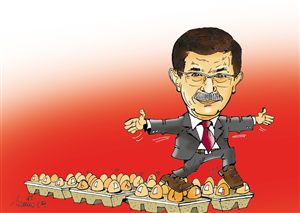
Defly exploiting the street cred it acquired by refusing US troops permission to pass through its territory for the invasion of Iraq, Ankara began to mediate between Syria and Israel till the brutal Israeli assault on Gaza in Operation Cast Lead caused Turkey to break off the talks. Turkey’s steadfast support to the Palestinians has won it the support of Arabs, especially since President Hosni Mubarak of Egypt is 82 and less active and the veteran Saudi foreign minister Saud al Feusal allegedly has Parkinson’s disease. Relations with its neighboring states has also been strengthened since the financial crisis beginning in 2008 which led to falls in Turkish exports to the EU and to a rise in its exports to its eastern neighbors.
Prime Minister Recep Tayyip Erdogan and Davutoglu engaged in shuttle diplomacy between Tiblisi and Moscow as Russian troops intervened on behalf of South Ossetia and Abkhazia in 2008 during a brief war. Ankara has also promoted a series of meetings between Serbia, Croatia, and Bosnia.
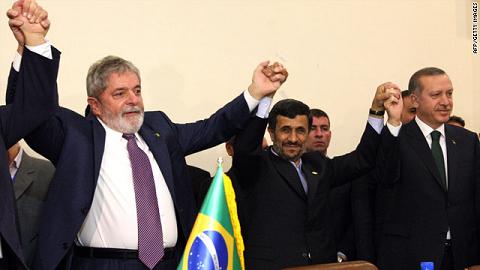
More crucially, along with President Lula of Brazil, Erdogan has intervened in the dispute between the US and its allies and Iran over the latter’s nuclear energy program. Equally importantly, in November 2008, Davutoglu became in November 2009, the first high-level Turkish official to visit to the Kurdish Regjonal Government in northern Iraq which is akin to an Indian foreign minister visiting Pakistan-occupied Kashmir.
Meanwhile, India has emerged as the largest regional donor of reconstruction aid to Afghanistan, Relations between India and Afghanistan had been close till the Taliban captured power in 1996. Now, the US occupation forces and India share a common goal in eliminating Islamic extremists and it is telling that Pakistan was not invited to the high-level NATO security briefing that was attended by Iran. In large part, this is the result of the US promoting India as a regional counter-weight to China but also in part due to the relationship between the Pakistani military and intelligence services with the Taliban and al-Qaeda. The US is also courting India to provide a counter-weight to Iran.
Despite Iranian President Mahmoud Ahmedinejad’s vocal opposition to Israel’s brutal oppression of the Palestinians and to US policies more generally, Iran’s growing influence in Iraq and Afghanistan where US forces are bogged down in a war they cannot win implies that the US can only extricate their forces with Iranian cooperation or an entire region with much of the world’s proven oil reserves will endure decades of political instability.
When much attention has been focussed on regional integration in east and southeast Asia, the developments sketched here suggest that there is a parallel re-emergence of regional linkages between west and south Asia. This suggests that the geopolitical regions of the world are being reshaped with much of East and Southeast Asia being reoriented towards China, while Turkey, India, and Iran are emerging as important regional powers in a re-contoured ‘geographical pivot of history,’
Peering Beyond the US Midterm Elections
October 19, 2010 at 11:17 pm | Posted in Political Economy | Leave a commentTags: 21st Century Capitalism, Afghanistan, Iran, Iraq, Manufacturing, US Economy
What is likely to happen if the Republicans win control of one or both houses of Congress? The issues underlying the discontent of voters stem from the loss of employment and increasing inequality; of losing homes sold on dreams while they see the bankers walk away with millions of dollars in bonuses; fear of a further erosion of jobs overseas or to immigrants; belief that if only government spending is lower, taxes will fall and conditions will be better for the poor.
Regardless of the propaganda that it is unfair currency manipulation by other countries that is leading to a loss of jobs, the underlying cause is very different and no politician or party has a solution to the problem. Well paying jobs are disappearing because of technological changes. The evidence is everywhere–growth of emails and the Internet leads to a decline of post office jobs; the internet is as much of a threat to shopping malls and big box stores as these were to main streets; automated check-in machines at airports decimates counter staff; Netflix has spelt the doom of bricks and mortar video stores. No political party or economist has the remotest idea of what to do in these conditions, least of all the know-nothing Republicans affiliated to the Tea Party!

If other countries were to raise the value of their currencies, it means that they will no longer buy as many dollars as they had to keep their currencies “undervalued.” It was the repatriation of current account surpluses and domestic savings from China and other countries through their purchase of US dollars that enabled them to manipulate exchange rates. This massive inflow of capital enabled the Bush–and now Obama–Administration to fight two wars in Iraq and Afghanistan while cutting taxes. Without such capital inflows, taxes would have to rise or the US military will have to turn tail and slink back.
Perhaps, this is may explain why the US has swallowed a bitter pill and invited high Iranian representatives to in-depth briefings on Afghanistan by the military commander, General David Petreus and even begun to transport Taliban leaders to Kabul for talks in NATO aircraft. Iran’s footprint has also solidified in Iraq where the Shi’ite cleric Muqtada al-Sadr, allied to Iran, has emerged as king-maker. Any move against Iran will unravel US plans to withdraw from Iraq and Afghanistan.
Despite all this, if the Congress cuts taxes, it would mean cutting into the bone of welfare state, removing any semblance of a safety net under the poor. It will exacerbate the income gap between the rich and poor, already wider than at any time since the 1920s since a Republican victory in the elections will ensure that the rich cats will continue to walk away with bonuses in the seven and eight figures. Why else will they contribute so disproportionately to Republican candidates in the current election?
All of this does not even begin to address the military situation. What will the neocons make of the Taliban being invited back into power in Afghanistan and Iran exercising considerable influence in Iraq. And the Iraqi oil? Estimates of Iraq’s proven oil reserves has increased by almost 20 billion barrels but all of this is being exploited by Russian, Chinese, and other Asian companies–not US Big Oil!
Create a free website or blog at WordPress.com.
Entries and comments feeds.
